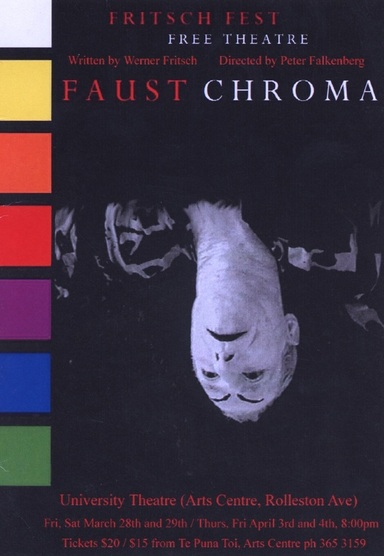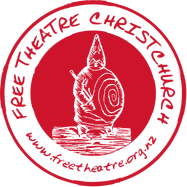|
Goethe's Faust is to Germany what Shakespeare's Hamlet is to the English-speaking world: the greatest play, by the greatest author, creating the greatest national role. Faust is the prototype German character, always striving, never satisfied, who gets seduced into a pact with the devil.
Gustav Gründgens is widely considered the best German actor of all time. He is most famous for playing the role of the devil (Mephistopheles) in productions of Faust that he himself directed. Though he played Mephistopheles, the real-life figure Gründgens had perhaps more in common with Faust, having himself made a pact with the Nazis. Hermann Göring, the designated successor of Hitler, appointed Gründgens as head of all the state-run theatres in the Reich. In the early '60s, Gründgens decided to quit acting and instead "live real life" by travelling the world. His first trip was to Manila, Philippines, where he died suddenly in his hotel room. Suicide was suspected. Faust Chroma begins in Manila, 1963, where Gründgens' fever hallucinations and drug-induced rants awaken scenes from both his theatrical productions and his life. We see a pre-Nazi cabaret party where Gründgens performs with the daughter and son of author Thomas Mann: one became his wife, the other his lover. We see his early encounters with the Nazis, with Gründgens forced to defend his sexuality and later forced to remarry. We see fantasy scenes from the theatre, love scenes with the wife of Hermann Göring, and Hitler as an admiring audience member. Theatre and life are mixed up throughout: Gründgens played roles in both. For Gründgens, it seems, a decision to quit acting was a decision to quit living as well. |
I'm encouraging people to go along because it stimulates and entertains; because it's sensual, relevant and rich; because it's damn good theatre. Premiered University Theatre, March 2008 (Fritsch Fest)
Toured to Mary Hopewell Theatre, (2008 Dunedin Fringe) Performed University Theatre, May 2008 (Platform Arts Festival) Performed University Theatre, February 2009, (Wellington tour launch) Toured to Gryphon Theatre, February 2009, (Wellington Fringe) Toured to Centrepoint Theatre, Palmeston North, February 2009 Best Theatre, 2008 Dunedin Fringe (Nominated: Best Production Design, 2008 Dunedin Fringe) Best Production Design, 2009 Wellington Fringe (Nominated: Best Theatre, 2009 Wellington Fringe) Nominated: Montana Award for Most Original Production, 2009 Chapman Tripp Theatre Awards |
Publicity
Segment on TV3's Nightline
Tova O'Brien Werner Fritsch with Lynn Freeman Arts on Sunday, RadioNZ "A manifesto of daring theatre" Chris Moore, The Press ReviewsPublicity and Reviews from Feb 2009 tour MIND-BLOWING Lynn Freeman, Capital Times Faust Chroma Helen Sims, The Lumiere Reader Memorable and thought-provoking John Ross, Theatreview Two exciting shows work on the emotions Laurie Atkinson, The Dominion Post A rich feast for the intellect and senses John Smythe, Theatreview German play questions view of reality Michelle Duff, Manawatu Standard Life is a cabaret, old chum! Richard Mays |
Reviews from April 2008: In Praise of the Catalysts of Thought: The Free Theatre's Faust Chroma Creon Upton, publicaddress.net, 7 April 2008 Faust Chroma Neal Barber, The Critic, 17 April 2008 What a triumph... Berenike, CANTA, 2 April 2008 Startling Productions with Two Faces Lindsay Clark, Theatreview, 30 March 2008 Free Theatre's Faust Chroma Jared Wells, Presto And it's goodnight from Fringe... Neal Barber, Critic, 17 April 2008 |
When you are in the company of Free Theatre performers, you experience the cohesion, exploration and manifestation of dedicated ensemble work. Free Theatre's interpretation of this classic piece is richly textured with the language of theatre in spades. Exquisitely expressive and physical Faust Chroma is masterly rendered to comment on the perennial issue of excess power without conscience. Deservedly the winners of the Best Theatre award at the recent Dunedin Fringe Festival, along with Nominee for Best Production Design. |
Letter of SupportTO WHOM IT MAY CONCERN: My wife and I happened to be in Christchurch, when 'The Free Theatre' showed their performance of Werner Fritsch's plays. We went very sceptically. The plays are concerned with a not so pleasant part of German history. Nazism and especially the crooked figures of Hermann and Emmy Goering on the one hand and the complicated and very German connection between Gustav Grundgens, the myth of Faust on the other. And two of his extremely complex plays to be performed more or less one right after the other. We came back convinced and overwhelmed. Not only was there a congenial translation or rather transformation into English, great directing, but there was a quality of acting, a total dedication to the plays, an identification of the actors and actresses with a highly sophisticated web of content and language which left us speechless. In all respects the performances were on level with the ones we saw in Berlin some years ago, both of them at professional theatres. Absolutely first class and the aura which the play seeks to evoke was right there, 20,000 km's away from Berlin. Incredible work! If this sounds overexcited, we were that, and still are. |



